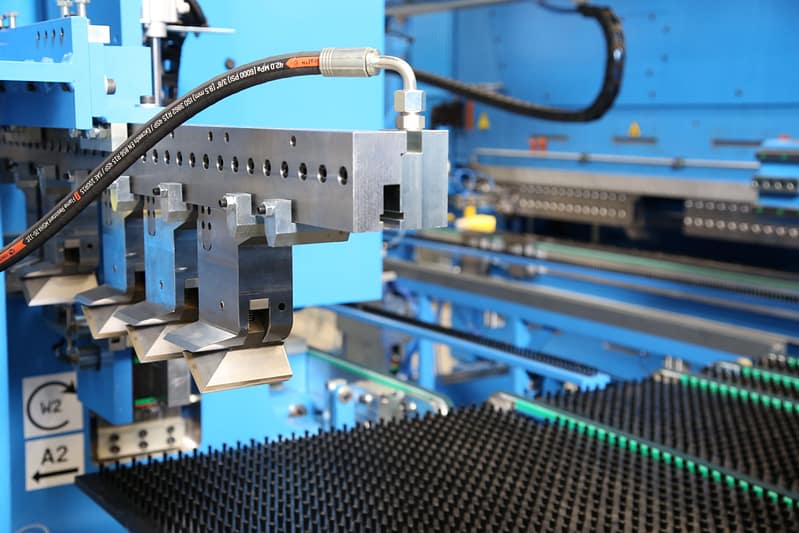Energy Consumption and Efficiency
When it comes to the world of sheet metal fabrication, energy consumption is a big deal. It’s like the elephant in the room that affects both your wallet and Mother Earth. Traditional folding methods often lean on standalone CNC machines, which can guzzle energy like there’s no tomorrow due to their solo operations and the constant need for human touch. But hey, there’s a silver lining! Thanks to the whiz-bang advancements in automation, like those from Pivatic’s folding technologies, energy efficiency has taken a giant leap forward.
Picture this: automated folding lines that smooth out the production process by rolling multiple stages into one seamless system. This nifty integration means you don’t have to power up separate machines individually, which is a win for your energy bill. Plus, with automation handling tool changes and part juggling, idle times are cut down, making sure energy is put to good use during production cycles.
Take Pivatic’s PivaBend systems, for example. They use servo-electric and hydraulic benders, picking the right one based on the material type and thickness. These systems are like energy whisperers, tweaking power output to match the task at hand. This not only boosts efficiency but also helps shrink the carbon footprint of the manufacturing process. Talk about a win-win!
Material Usage and Waste Management
Let’s chat about material usage and waste management—two peas in a pod when it comes to cutting down the environmental impact of folding technologies. The old-school methods often lead to a mountain of material waste, thanks to human slip-ups and clunky cutting and bending processes. But fear not! Automated folding technologies, like the ones Pivatic has cooked up, bring precision and consistency to the table, slashing waste to a minimum.
Pivatic’s folding technologies are like the gentle giants of the manufacturing world, handling delicate materials like pre-painted stainless steel and aluminum with kid gloves. This is crucial for reducing material waste, as it ensures each piece is processed right the first time, nixing the need for do-overs or scrap. The programmable nature of these systems means you can control dimensions and sequences with pinpoint accuracy, making the most of every material.
And there’s more! By weaving folding technologies together with other processes like spot welding and clinching, production becomes a well-oiled machine, cutting down on extra material handling. This all-in-one approach not only boosts efficiency but also champions sustainable practices by keeping waste generation in check.
Impact on Carbon Footprint
Let’s face it, the carbon footprint of manufacturing processes is a hot topic these days. Folding technologies have a big say in the environmental impact of sheet metal fabrication. By jumping on the automated solutions bandwagon, companies can give their carbon emissions a serious trim.
Pivatic’s folding technologies are like the eco-warriors of the manufacturing world, helping to lower the carbon footprint in several ways. First off, automating production lines means less need for manual labor and the energy that comes with it. This leads to a drop in greenhouse gas emissions from both the manufacturing process and the energy needed to power the gear.
Plus, with Pivatic’s systems offering snappier cycle times and shorter setup times, production can wrap up quicker and more efficiently. This not only saves energy but also lightens the overall environmental load of the manufacturing process. By making the most of resources and keeping waste to a minimum, Pivatic’s folding technologies pave the way for a more sustainable approach to sheet metal fabrication.
Innovations in Sustainability
As global trends keep waving the sustainability flag, innovations in folding technologies are key to keeping up with the times. Pivatic is leading the charge, crafting solutions that fit the bill, offering high-performance systems that put environmental responsibility front and center.
One of the standout innovations in Pivatic’s folding technologies is the use of automated tool change systems. These systems kick manual setups between batches to the curb, slashing downtime and energy use. By making sure tools are always on point for the task at hand, Pivatic’s solutions boost both productivity and sustainability.
What’s more, Pivatic’s dedication to designing machines that play nice with a wide range of materials, including those with sensitive surfaces, shows a real commitment to sustainable practices. By enabling the efficient processing of diverse materials, Pivatic supports the use of eco-friendly materials in manufacturing, further pushing the sustainability envelope.
In a nutshell, the environmental impacts of folding technologies are a mixed bag, covering energy consumption, material usage, carbon footprint, and sustainability innovations. By harnessing advanced automation and precision engineering, companies like Pivatic are blazing a trail in creating more sustainable and efficient sheet metal fabrication solutions. As industries keep evolving, embracing such technologies will be key to striking a balance between productivity and environmental responsibility.
